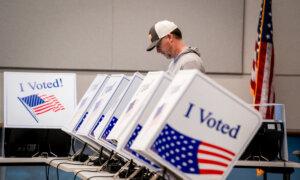‘Embryos to me are babies,’ Ms. Haley told NBC News on Feb. 21, noting that she had her son, Nalin Haley, through artificial insemination.
GOP presidential candidate Nikki Haley came out in support of an Alabama Supreme Court decision that deemed embryos made through in-vitro fertilization (IVF) as living beings.
Ms. Haley, who is pro-life, remarked that it is one thing to save sperm or eggs, “but when you talk about an embryo, you are talking about, to me, that’s a life.”
Therefore, she said, “I do see where that’s coming from when [the Alabama Supreme Court ] talk[s] about that.”
Nonetheless, said Ms. Haley, conversations about IVF are “incredibly personal” and “incredibly sensitive.”
“That’s the conversation the doctor needs to have with the patient,” she said. “Let’s never underestimate the importance of the relationship between a doctor and patient when they’re doing any of that.”
Ms. Haley’s call for a sensitive approach to the IVF issue echoes her tone on the issue of abortion, which she said needs to be treated with a “respectful” mindset and where there should be a consensus.
The Feb. 16 ruling came as part of a lawsuit in which plaintiffs claimed damages for embryos stored at a cryogenic facility that was destroyed.
In its decision, the Alabama Supreme Court pointed out that the central question in the case was whether unborn children located outside of a biological uterus at the time they are killed are exempted from the Wrongful Death of a Minor Act.
“Neither the text of the Wrongful Death of a Minor Act nor this Court’s precedents exclude extrauterine children from the Act’s coverage. Unborn children are ‘children’ under the Act, without exception based on developmental stage, physical location, or any other ancillary characteristics.”
The case was brought by a group of couples against a fertility clinic operated by the Center for Reproductive Medicine. Between 2013 and 2016, the couples approached the center to undergo in vitro fertilization (IVF) treatments. The center succeeded in joining eggs and sperm outside the womb, gestating the embryos for a few days, and placing them in a “cryogenic nursery.”
The nursery is a facility designed to keep embryos alive at a fixed developmental stage, preserving them at a low temperature. If properly maintained, the embryo can remain alive “indefinitely.”
The plaintiffs raised several concerns in the case regarding exempting extrauterine children from the Wrongful Death of a Minor Act.
Such a move would deprive their parents of any civil remedy against people who kill their unborn child after the child has left the uterus but before the child has been fully delivered from the birth canal, they said. They also warned that the exemption could raise “serious constitutional questions.”
The defendants argued that the embryos do not qualify as children or people. According to the majority opinion, the plaintiffs pointed out that such a condition would mean that “even a full-term infant or toddler conceived through IVF and gestated to term in an in vitro environment would not qualify as a ‘child’ or ‘person.’”
The defendants argued that not creating an exemption for extrauterine children would result in “undesirable” public policy outcomes.
They claimed that the lack of an exemption would “substantially increase the cost of IVF in Alabama” and make cryogenic preservation onerous. The Medical Association of the State of Alabama stated in its amicus brief that the “costs and storage issues would be prohibitive.”
The ruling noted that these are policy-focused arguments that belong to the state legislature and not the court. Judges are required to conform their rulings to the law and the Constitution, it stated.
“It is not the role of this Court to craft a new limitation based on our own view of what is or is not wise public policy,” the court stated.
Original News Source Link – Epoch Times
Running For Office? Conservative Campaign Consulting – Election Day Strategies!


